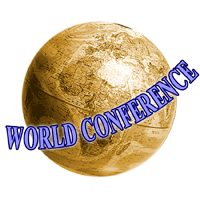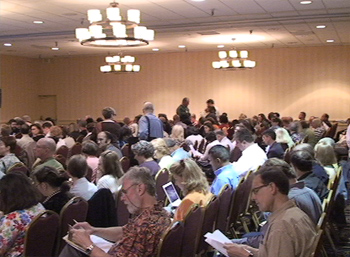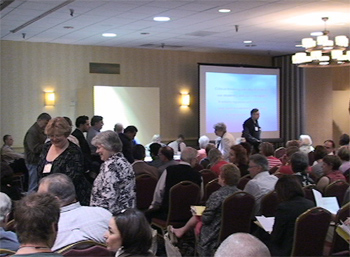 Conference Theme:
Conference Theme:
Fostering Intellectual Discipline
The World's Oldest Annual Conference on Critical Thinking
July 20-23, 2009
Preconference: July 18-19
at the DoubleTree Hotel and Executive
Meeting Center, Berkeley Marina, California
| CONFERENCE MENU |
|
The Center and Foundation for Critical Thinking have together hosted critical thinking academies and conferences for more than a quarter century. During that time, we have played a key role in defining, structuring, assessing, improving and advancing the principles and best practices of fair-minded critical thought in education and in society. We invite you to join us for the 28th International Conference on Critical Thinking. Our annual conference provides a unique opportunity for you to improve your understanding of critical thinking, as well as your ability to more substantively foster it in the classroom and in all aspects of your work and life.
There is no more important goal in teaching than fostering intellectual discipline.
 Intellectually disciplined students:
Intellectually disciplined students:
Intellectual discipline is essential to the educated mind. However, we do not foster it at the expense of the emotional life of students. Rather we help students take command of their emotions, feelings and desires through the use of reason. We avoid teaching in such a way that students become overly self-critical, or obsessive about learning in order to make the grade or pass the test. We want students to experience the joy of learning, which they can do best when they take command of their learning and the development of their own intellect. We want them to understand the intimate relationships that exist between their feelings, emotions and desires. We want them to develop emotional intelligence, so that they learn to deal with their feelings and desires in productive and successful ways. We want them to become passionate about learning, and to learn the skills necessary for honestly confronting the day to day problems inherent in learning at a deep level.
 The conference will consist in approximately 40 conference sessions offered over four days. Participants will choose in advance the sessions offered on days one and two, day three - afternoon, and day four - morning. At the conference, participants will choose from a number of concurrent sessions offered on the third morning of the conference. We invite both new and returning participants to join us for the preconference, to be held July 18-19, 2008.
The conference will consist in approximately 40 conference sessions offered over four days. Participants will choose in advance the sessions offered on days one and two, day three - afternoon, and day four - morning. At the conference, participants will choose from a number of concurrent sessions offered on the third morning of the conference. We invite both new and returning participants to join us for the preconference, to be held July 18-19, 2008.
All conference sessions will be designed to converge on basic critical thinking principles and to enrich a core concept of critical thinking with practical teaching and learning strategies. For a fuller explanation of core critical thinking concepts review the Thinker's Guide Series or articles from our library.
Throughout our work we emphasize and argue for the importance of teaching for critical thinking in a strong, rather than a weak, sense. We are committed to a clear and "substantive" concept of critical thinking (rather than one that is ill-defined); a concept that interfaces well with the disciplines, that integrates critical with creative thinking, that applies directly to the needs of everyday and professional life, that emphasizes the affective as well as the cognitive dimension of critical thinking, that highlights intellectual standards and traits. We advocate a concept of critical thinking that organizes instruction in every subject area at every educational level.
Here is a draft program (sessions will be finalized presently):
PRECONFERENCE SESSIONS
(participants will choose one of the following sessions)…
CONFERENCE SESSIONS
DAY ONE:
(participants will choose one of the following sessions)…
DAY TWO MORNING:
(participants will choose one of the following sessions)…
DAY TWO AFTERNOON:
(participants will choose one of the following sessions)…
DAY THREE MORNING
(participants will choose from among 20+ one-hour concurrent sessions at the conference)
DAY THREE AFTERNOON
(participants will choose one of the following sessions)…
DAY FOUR MORNING
(participants will choose one of the following sessions)…